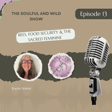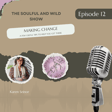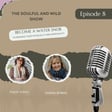Beekeeping and Permaculture
00:00:16
Karen Seinor
Hello, thank you very much for joining me. I just wanted to chat with you today about the bee situation. Now, many of you would know that I have a couple of beehives in my garden. It's part of my permaculture system and keeps me happy and connected to nature.
00:00:35
Karen Seinor
And of course, there's also all that that whole beautiful thing about the mythos around the feminine aspect of the bees you know their supremacy um and just the magic too of seeing the colony operate as a whole being it is it is actually a beautiful it is really a hobby i decided at one point i was overworking and i was like karen you actually need a hobby and so for some reason this dropped into my head and i just launched into it but
00:01:12
Karen Seinor
That was about um six years ago now, so I'm still a learner beekeeper. And I actually have three different kinds of hives. I've got a Kenyan top bar hive, which is definitely my favourite.
00:01:28
Karen Seinor
I've got a flow hive and also ah more traditional, shall we say, traditional in terms of mainstream Langstroth hive which is a box you know and you'll see them around about the countryside often painted bright colours with white lids you know those sorts of hives are used mainly by commercial beekeepers and many hobby beekeepers have got into it just because you know we follow what is i guess the norm and they're also easy to move around you know
00:02:05
Karen Seinor
in the sense of stacking if you want to transport them and so on.
Varroa Mite Threat in Australia
00:02:09
Karen Seinor
So what is going on in the world of the honeybee right now is very, very interesting here in Australia.
00:02:18
Karen Seinor
I'm on the border of Victoria and New South Wales in Albury, and live just in a little residential place in um town.
00:02:30
Karen Seinor
And I'm sure you will have heard of the Varroa mite, it is a pest that um damages be colonies and Australia is the last country to have gotten it.
00:02:44
Karen Seinor
New Zealand was second last and we got it a couple of years ago. Now the Department of Primary Industries tried to eradicate it so they had a bit of a task force and they were doing and you know beekeepers were testing for Varroa and
00:03:04
Karen Seinor
They located it all around you know the area in New South Wales where it came in via the port apparently. And a lot of beehives were actually burnt to the ground in an effort to kill the mites. Now, what actually happened, and this is, of course, not all absolutely 100%. This is my understanding, so let me put that little disclaimer in.
00:03:28
Karen Seinor
My understanding is, and I have seen you know emails and so on about much of this, and
00:03:38
Karen Seinor
that although it was being treated very severely around New South Wales near the port, up Newcastle Way, um permission was given for commercial beekeepers to move their hives on trucks to the big orchards like the almond orchards to pollinate them for crops.
00:04:04
Karen Seinor
So ultimately what's happened is that varroa mite has spread probably more more quickly than it would have if um those big truckloads of bee boxes had not been sent around. I mean, that's just my thought.
00:04:25
Karen Seinor
And it's kind of logical, isn't it? so It's a no-brainer. Anyway, it's... In various places in New South Wales now, many people have lost their hives. Basically, this little varroa mite, it's fairly sizable for a pest that gets on a bee because bees are pretty small.
00:04:45
Karen Seinor
And the reference point, I suppose, would be for like for us humans having a dinner plate attached to our back and sort of going about our business and doing our life.
00:04:58
Karen Seinor
And so that's what the bees are dealing with once Varroa mite arrives in their hive and get infests the hive. And what it does is it it weakens the hive, basically. and So mama Varroa mite goes in and she lays eggs in where the baby bees, in the little cells where the baby bees are.
00:05:25
Karen Seinor
And then those... those little broal mite sort of larvae, they actually feed on the baby bees the fat. And I think I have that right.
00:05:38
Karen Seinor
Anyway, so once those baby bees come out, they've got blimmin' broal mites on them and it's on for young and old. And, of course, once the bees get, um they've got these pesky pests with them, it challenges them.
00:05:54
Karen Seinor
You know, they're physically weakened because the mites are feeding off them and the bees have to deal with that. Now I know with my hives my bees are so chilled out they're very relaxed little poppets.
00:06:10
Karen Seinor
um One of my neighbours came in and drilled some holes in my Kenyan top bar hive last week so that I could adjust it on some new information I had and We were both wearing suits, but my bees just went about their business. They did not get cranky.
00:06:28
Karen Seinor
They were just like, oh, buzzing around. What's going on here? He's making all these vibrations in our house. But there was no stinging or carrying on. So our bees, mine in particular, are pretty relaxed about what's going on. As long as you're moving slowly and not creating too much of a ruckus, they just get on with their business and let you get on with theirs.
00:06:53
Karen Seinor
And so in a way, this is kind of a problem for us because as this mite does arrive and infest um local hives, our bees aren't that aggressive.
00:07:06
Karen Seinor
And so they're not going to necessarily attack those mites. but So that's that's kind of a breeding issue. But I guess my...
00:07:20
Karen Seinor
reason for talking to you about it is this is going to have a massive impact on our our food security, on our crops. So what's happened in the United States is, well,
Chemical Treatments vs. Natural Resistance
00:07:34
Karen Seinor
number one, they were losing initially, and they've had it for about 30 years now.
00:07:40
Karen Seinor
So they've got a lot of experience dealing with this pest, and they've got other issues as well. So
00:07:51
Karen Seinor
days In the US and other countries some other countries, they've actually treated the beehives, the bee colonies, with chemicals. Some are natural-based and some are not.
00:08:05
Karen Seinor
And one of the interesting things about bees, they have this fascinating capacity to drop DNA. So they have a trait within them.
00:08:17
Karen Seinor
It could be any trait. And if it's not used, they will shed that trait. They shed that DNA if it's not useful or used, utilised.
00:08:28
Karen Seinor
Therefore, they consider it's not useful, they drop it. So one of the theories that's being spoken about in terms of treating our honeybee colonies varroa mite is that if we treat our beehives with these chemicals,
00:08:51
Karen Seinor
that any of the beehives that actually have a resistance to the mite, if they're treated with the chemicals, they will drop any DNA that makes them um resistant to the Varroa.
00:09:09
Karen Seinor
So that's a bit of a challenge and that's an interesting thing. now Most of you will know that I'm really into permaculture and I prefer to be as chemical free as possible in my garden and my food production in the veggie garden and so on.
00:09:24
Karen Seinor
ah So my natural bias is to go without chemicals. But of course, what I do in my garden apiary is potentially going to impact my neighbour. And i've across the road, I have a ah lovely neighbour who's been a great supporter of me in my learning of um beekeeping practices and he has hives so just diagonally across from where I live so now I know that he's going to um do some treatment if his hives get varroa which is highly likely at some point so you know that's a big consideration for me so I wanted to go and do some research now a guy by the name of Adrian Iodese who
00:10:12
Karen Seinor
has His website is happierbees.com. He runs some training courses and stuff. a Really interesting guy. And I bought my Kenyan top bar hive kit from him from Reclaim Timber, and it's just beautiful.
00:10:28
Karen Seinor
It's definitely my favourite hive. um And he spoke with – he's pretty connected in the bee world um and has studied, I believe – biodynamic farming and all that sort of stuff in Europe, I believe.
00:10:46
Karen Seinor
Anyway, he's quite connected in the bee world. And he spoke with Les Crowder, who's very well known, written a book and quite an expert in treatment-free or chemical-free beekeeping.
00:11:04
Karen Seinor
And he he actually has been a big... advocate for the Kenyan top bar hive and um You can actually get plans for those Kenyan top bar hives from His lovely associate
Personal Choices in Beekeeping
00:11:21
Karen Seinor
Natalie B. I think it's be aware.com BW-A-WARE.com and they're Les's plans for a Kenyan top bar hive Anywho, so Adrian was speaking with Les and Natalie and they came out to Australia
00:11:39
Karen Seinor
with some other guys and they did talks all around the place and they were talking about their experiences working with Kenyan top baha'is in Texas and not using chemicals to manage their colonies, beehive colony same deal right, and and the success that they've had.
00:12:06
Karen Seinor
no So anyway, I trucked off to to Canberra to listen to them speak I attended a workshop and then a talk um at the Canberra Bee Club.
00:12:20
Karen Seinor
What an amazing club, actually. Really, really interesting. Evidently, there's one of their members is working, think it's government funded, actually, working in an apiary there in Canberra with the whole idea of breeding varroa-resistant queens, you know trying to get a heads up, because one of the things the government has decided is to not import ah queen bees into the country. So that's kind of a, is that a good thing, is it a bad thing?
00:12:57
Karen Seinor
Because there are some places that do actually have resistant queens already, because in other countries... you know, they've had varal for a much longer time.
00:13:09
Karen Seinor
Anyhow, that's, so ah went off to this course and this talk and listened to these people with both 30 and 15 years experience dealing with this.
Historical Context and Expected Losses
00:13:20
Karen Seinor
And it's given me the confidence to
00:13:26
Karen Seinor
really settle into my decision. It's helped me to make a decision to not use chemicals on my beehives. So, They did talk about, and there were people within the audience who have actually lost hives, like one lady that I was sitting next to in the audience. She had four beehives on her property and three of them, boom, totally dead.
00:13:53
Karen Seinor
The borough came in and just knocked them out. She was, of course, completely devastated because one of the things about beekeepers is we're kind of weirdos, right? often referred to beaks, you know, as in bee geeks, and just love and are completely fascinated by these incredible beings.
00:14:15
Karen Seinor
So she was really just heartbroken. And there were other people in the audience who've, you know, gone to their they're bees and they're just completely dead or they've absconded because the mites have got in there and just hammered them.
00:14:32
Karen Seinor
So it's a real thing. In the US, I believe 80% to 90% of hives went down.
00:14:44
Karen Seinor
And the expectation or the the the things that are being thrown around is that that's what we can expect, to lose between 80% to 90% of our bee colonies in this country.
00:14:58
Karen Seinor
That's not all going to happen instantly because... there's a process, you know, it's from Newcastle to Wodonga. All right, that's a bit of distance. It's taken a little bit of time.
00:15:11
Karen Seinor
um But, you know, spring here, so hives will swarm and the mite will get spread. And I mean, bees travel for food for up to three kilometres.
00:15:25
Karen Seinor
So they're all popping into each other's, you know, rubbing shoulders, hanging out on the same flowers. So it'll spread. There's no stopping that, actually.
00:15:39
Karen Seinor
So it's going to happen one way or the other. um Temperature does impact it clearly from what we've seen in other places in the world. And there are ways to... I mean, my take on the whole chemical thing is there are various...
00:15:59
Karen Seinor
different options and there's set mechanical things that you can do. There's something called, um you know, I won't get into all the terms, but this' there's things that you can do to assist your hives if they do get varroa.
00:16:15
Karen Seinor
It's called doing a brood break to sort of try and reduce the ability of the mite to breed. But you can only do that for so long.
00:16:28
Karen Seinor
There are some implications. For example, if you're going into your hive every couple of weeks, which is what the Department of Primary Industries wants us to do to test for Varroa, you you're taking a cup of bees off the brood frames where you know they're the they're the nurse bees that look after the babies.
00:16:49
Karen Seinor
And you take a cup of those bees and you have to throw them into alcohol and basically you're killing them. and you but you're shaking them in the alcohol, they die, so that you can see how many mites, and you do a mite count.
00:17:02
Karen Seinor
And then if there's a certain number of mites, you then will treat with chemicals. And what they learnt in the US is that if you keep using the same chemicals, and we know this is basic, we've seen in other situations with colds and flus, right, that the the pest ah becomes...
00:17:24
Karen Seinor
was resistant to the treatment they get stronger so they're wanting us to use one kind like you can use a more natural based one and then you use a completely foreign chemical one and swap it around but there are some real downsides and there's a lot of things that isn't aren't a hundred percent absolutely known so the u.s. s Went one way, they've got weakened hives.
00:17:56
Karen Seinor
In fact, there's been a big there has been a big export business from Australia supplying the US with beehives, bee colonies, to pollinate their hives because theirs were dying at such a rate. Well, they're not going to be getting that from us anymore because we've now got the mite ourselves.
00:18:16
Karen Seinor
So there's going to be big implications in the US for pollination, for food crops, and we're going to experience that too. Not necessarily immediately, but as it spreads, it'll become a much bigger thing.
00:18:32
Karen Seinor
The experts that I was listening to were talking about the opportunity to allow this process to happen faster.
00:18:46
Karen Seinor
than it would otherwise. So I'll give you an example, and you can research this on Google if you're interested.
Cuba as a Model for Recovery
00:18:53
Karen Seinor
There's quite a few different examples. Cuba is one country, a poor country,
00:18:59
Karen Seinor
um definitely in the tropics, you know, it's a warm environment. They didn't have the money to treat because it costs a lot of money to treat with all these chemicals, you know, follow the money.
00:19:12
Karen Seinor
Who's making money out of this? Definitely not the the home beekeepers and definitely not the commercial beekeepers because it's going to cost a lot of money to treat these hives with chemicals.
00:19:24
Karen Seinor
So in Cuba, they did not treat at all and they had a total collapse of their honey industry. Ten years later, absolutely thriving.
00:19:36
Karen Seinor
Absolutely thriving. the They're stronger than ever before. Their honey production is super high. So the bees themselves, yes, they lost heaps, but those that survived, they actually they actually did that Darwinian thing and adjusted. Don't mind my puppies in the background having a little of play and a bark by herself.
00:20:03
Karen Seinor
So that it it was ah really was no different. And I learnt about this when I went to ir a DPI workshop and they were talking to us about how to treat with the chemicals and so on.
00:20:15
Karen Seinor
Someone mentioned Cuba, i asked about it. And fundamentally, the timeframe that Cuba came back stronger than ever before and the expected timeframe for us to recoup is not really any different.
00:20:32
Karen Seinor
But in Cuba, because they didn't treat, they have ah bees, the species of bees that are stronger than ever before, totally managing, no chemicals residue in their system, in the wax in the hives, potentially in the honey, potentially,
00:20:52
Karen Seinor
um as opposed to having colonies that can't make it without chemical treatment that are weakened.
00:21:03
Karen Seinor
And I know in the US they have something called you know colony collapse and deformed wings. Oh, God, what's the name of it?
00:21:15
Karen Seinor
And they get these deformed wings. So other viruses, so once theusee once the bees get, like like us, no different, we're all living beings.
00:21:26
Karen Seinor
We are all living beings, right? Once our... our strength goes down once our immunity is lowered, we become... We're weakened, and then other viruses can infect us and pop up almost as though out of nowhere when we're weakened.
00:21:48
Karen Seinor
So there's a big thing going on. Now, do not be fooled buying...
00:21:59
Karen Seinor
buying um Crap honey, really. It's bananas. a lot of A
00:22:08
Karen Seinor
a lot of the honey that you buy in the supermarket, for example, is actually not Australian.
Supporting Local Beekeepers
00:22:14
Karen Seinor
They might say that there are some Australian or there's some international, but there's a lot of honey from places like China and places where they're treating with chemicals and they're putting it into honey and saying it's Australian honey, selling it in our supermarkets.
00:22:29
Karen Seinor
Now, some of it is nothing more than bloody sugar water. um sugar water based honey, it's a completely different thing to real raw pure honey that you'll get from a regular beekeeper.
00:22:46
Karen Seinor
You know, your old mate up the road who's got a couple of hives in his backyard and sells a bit of honey on the side to his neighbours. That's the gear you want. I know locally here in Harris Farms for anybody who's local to where I live, and I'm sure they do it in places like Sydney and Melbourne too.
00:23:06
Karen Seinor
Local beekeeper sells his honey there. It's a great price. Like, seriously. My my beehe beehive, um my honey hobby is quite expensive.
00:23:20
Karen Seinor
it's it's It's not a cheap hobby, really. um
00:23:26
Karen Seinor
It costs you time and costs you money and... um you know, your equipment and so on. So, yeah, if you're going to buy honey, and it is a medicine, it's it's a medicine. It's not just for slapping over your toast and
00:23:45
Karen Seinor
smashing it down like it's, you know, it is actually a real medicine. The way I think about the honey is, and it'll last forever, so if you can get your hands on some honey, like if you can buy a couple of kilos and put away in your cupboard I would definitely be doing that i'd be doing that sooner rather than later because as this varroa might spread throughout the country your local even if it's not with you now in your area you might grab a couple of kilos put it away if it's sealed properly it'll be fine it'll last forever I mean they get it out of the um the pyramids it's still fine and
00:24:30
Karen Seinor
The way I think about it in terms of it being a ah healing medicine, and one of the things I actually like to do is when I extract my honey, I tend to do it by the frame, especially when I'm using my Kenyan top bar hive and and taking honey from there.
00:24:50
Karen Seinor
I'll extract it by the frame. So that one frame of honey that's made, that's all put down in one particular time frame. So all of the flowers that are in flower, the plants that are in flower at that time, that's a particular medicinal treatment.
00:25:12
Karen Seinor
You know, three months later, we've got different flowers. And so the essence or the healing properties within that honey is going to be different to the other frame.
00:25:24
Karen Seinor
So I do tend to extract by the frame. It's very time-consuming. It's a little bit geeky. But I, and and any of you who've used flower essences will understand that different plants have different healing properties.
00:25:43
Karen Seinor
We know that. Western medicine is based on that. And when you use a flower essence, sorry, I've gone off on a totally huge tangent here. i was going to just talk about what was going on the downside, but now I'm talking about the good stuff.
00:26:00
Karen Seinor
and Yeah, so
00:26:05
Karen Seinor
but if you've used flower essences, you will know that like the soul essence of the plant, it has a healing property for us when we use it and on many levels, soul level, emotional, mental, physical level.
00:26:26
Karen Seinor
So it makes perfect sense to me, having studied and worked with flower essences for decades, that when honey is created by the bees in a set period of time, those flowers and the honey that comes from that that pollen is a particular medicine.
00:26:49
Karen Seinor
So one of the things that I do is I trust when somebody... has a particular jar of honey, that's the medicine for them.
00:27:00
Karen Seinor
And I'll often you really trust my intuition when I'm selecting a jar to give to somebody. it's some It's a really beautiful, very soulful practice.
00:27:13
Karen Seinor
So there are big things afoot. Now, it's not going to happen overnight, but you know if you start hearing more about bees and pests, you'll know what it's about.
00:27:24
Karen Seinor
but it's deeply concerning. um The experts um that I listened to in Canberra a few weeks ago, they, well, Les Crowder, he was actually saying that he sees that we have the possibility of rebounding from this very quickly. So if all of our beekeepers made a decision to not treat with chemicals that yes we would have collapsed very quickly but we would also because of all the wild um colonies in the bush and we do have a lot of them but there will be a massive crash but those that ah survive the onslaught of varroa will do what they naturally do they'll
00:28:20
Karen Seinor
though those that survive will get on top of it and they will swarm in the springtime and they will, you know, expand out again.
00:28:31
Karen Seinor
And then beekeepers like myself, we can, you know, in three, possibly five years, we can go and collect those swarms and and start afresh if we've lost all of our colonies.
00:28:46
Karen Seinor
Now, I'm trusting... that That is not going to happen. It might. It might not. I'm just going to go with, I'm going to do what I need to do, trust my inner tuition and do those mechanical things that I can do and trust the bees to deal with this situation.
00:29:11
Karen Seinor
And that's what happens in nature. That's the truth of things. Very, very difficult because we are so attached But i my feeling is that if we interrupt this process too much with chemicals, that we could be extending the problem for a much longer time and we could weaken our possibilities of a good, strong comeback.
00:29:35
Karen Seinor
Now, mentioned Cuba, and there are other countries apart from Cuba where they've had extreme success in with their their honey industries and the bees in general.
00:29:49
Karen Seinor
coming back with non-chemical treatments, just mechanical treatment and trusting the bees to do their natural thing. So yeah, just so that you know what's going on.
00:30:03
Karen Seinor
Yeah. Now I used to sell a bit of honey, not much, and um give some away to my clients when I felt that it was appropriate to do that.
00:30:18
Karen Seinor
And I actually don't have that, like I don't have a big store of honey or anything. So if I'm fortunate enough to get some this year, I'll probably be popping it away for medicinal purposes, you know, for the family.
00:30:32
Karen Seinor
And just in case it's needed down the track, we'll see how the season goes. But it's a big deal, ah really big deal. And I would expect that in due course, as this rolls out, that...
00:30:47
Karen Seinor
the cost of food is going to go up again because the implications are significant. I mean, honeybees are not the only pollinators. We've got our natural bees, flies are pollinators.
00:31:01
Karen Seinor
There are other things, but we've used the honeybees a lot for pollination in these larger monoculture sort of crops like, you know, the almonds and and so on.
00:31:16
Karen Seinor
Yeah, so watch this space. Have your antenna up. and You know, what can you do to help this situation? That's something that I heard when I was at the um the talk at the Canberra Bee Club.
00:31:31
Karen Seinor
Great group of people, by the way. and One lovely gentleman standing up the back and brought this tray of holy basil in some plants that he'd grown.
00:31:43
Karen Seinor
And he actually said, We can all support the bees, even if we lose our colonies. The general public can support the bees in getting through this situation through nutrition.
00:32:00
Karen Seinor
And how do we do that? We grow plants that flower, that they can get food, good, broad quality food from. So if you have a veranda with pots on it,
00:32:14
Karen Seinor
If you have a garden where you can plant some flowers, do that because the more accessible, good quality nutrition is to the bees, the stronger they'll be. And especially in the winter, I've actually, um but just during the winter, I went into the local nursery and then also to Bunnings and had a look at what's flowering.
00:32:38
Karen Seinor
And even just do a Google search about what flowers in the winter because that's the hardest time for the bees. um late winter mid late winter and even early spring difficult times for the bees to find food and they get hungry when they're hungry they get a little cranky and you know their immunity is down they're struggling so greville is a great um've i've bought some of those and um planting those but Herbs are fabulous, like this lovely gentleman who brought in the holy basil.
00:33:12
Karen Seinor
And heaps herbs, they love basil, they love oregano, they love rosemary and lavender. Those things are so easy to grow. And certain shrubs and trees, but definitely the grevilleas, what them too.
00:33:28
Karen Seinor
So there's quite a few things that all of us can do. So number one, grow what you can in your garden so that the bees have good food and a plentiful array of it.
00:33:41
Karen Seinor
I don't know if you've seen those um those things on social media where they they plant out whole nature strips with wildflowers instead of grass. What a blimmin' great idea.
00:33:53
Karen Seinor
that's That's my plan. I want to dig out a bit of dirt off one part of my nature strip so i don't have to mow it also. and I want to plant some grevilleas, winter flowering grevilleas in there and...
00:34:07
Karen Seinor
so that the bees have got food in that difficult time. And I'm looking to find the right wattles. You know, look at your space you've got. There's there's heaps of information out there.
00:34:19
Karen Seinor
And there's something called the Wen Bee Foundation. they They actually have a fabulous list of plants that have got good pollen and good um nectar value.
00:34:36
Karen Seinor
So... You know, it's like oils ain't oils. Flowers aren't flowers, but any flowers are good flowers when it's winter. So, yeah, the things that you can do, plant some things that are going to flower to feed the bees so they've got good nutrition.
00:34:54
Karen Seinor
Do buy honey that's real, not this imported crap, to support the beekeepers and and expect to pay more money for your honey because it's going to become Real honey will become scarce.
00:35:09
Karen Seinor
Real honey, that's where the healing stuff is. and
00:35:15
Karen Seinor
You all know that chemical treatments are not always going to be the answer. Definitely not. We've seen that um many, many times over the last few decades.
00:35:27
Karen Seinor
When we think about, you know, the this is the rule, this is how we're going to do it. Short-term... gain long-term pain in a lot of situations. So, yeah, I'm thinking outside of the mainstream box a little bit, but it's it's well considered and, yeah, that's that's how I'm going to approach it and I'm going to trust that I can get through.
00:35:52
Karen Seinor
But statistically, 80% to 90% losses is what we're going to expect in the longer term. And it's the first couple of years ah that are the toughest.
00:36:04
Karen Seinor
One of the things that um Les Crowder and Natalie B and Adrian Iodisi have suggested is looking at breeding queens and getting knowledgeable about breeding resilient queens. So anybody who does have a beehive that makes it through the barrow or demonstrates resistance and managing the the ability to manage the mite, because some of the Some of the be bees in certain colonies are like attacking them, like chopping their heads off and their legs off. and
00:36:40
Karen Seinor
um So breeding queens from that stock is obviously going to be good.
Enhancing Resilience Through Queen Breeding
00:36:47
Karen Seinor
So I've booked myself into a queen breeding course for early December.
00:36:53
Karen Seinor
ah I hope that that's not going to be over my head, but I'm going to give it a whirl so that I have a bit more understanding and knowledge. You know, every day is a school day, right?
00:37:04
Karen Seinor
Little problem, big problem, big learning opportunity. Yeah, so that's what's going on in B-World at the moment as far as I know.
00:37:16
Karen Seinor
and yeah, you can help plant some beautiful flowers, get some honey in your cupboard, pop it away for medicine.
00:37:27
Karen Seinor
And, yeah. Just get the real stuff and support your local beekeepers, your local commercial beekeepers and even your home hobbyist beekeepers if you've got any around.
Supporting Bee Habitats
00:37:41
Karen Seinor
Bees are beautiful. Bees are amazing and we definitely do need them. And um supporting our native bees is really, really important. So things like those little native bee houses, you know, with all the...
00:37:59
Karen Seinor
Gosh, I can't remember what they're called. But you'll see them. They're sort of made wood There's a little like sort of house shape and there's all these round hold holes drink drilled through little bits of wood, all different sizes. So the different bees, because a lot of those are solitary.
00:38:17
Karen Seinor
They don't hang out in groups like the blue-banded bees. They need to have homes. So you could even put one of those up in your garden somewhere to encourage...
00:38:29
Karen Seinor
their safety somewhere to live and when you're providing food for them as well by growing good things in your garden yeah there's a lot we can do and we can just do what we can do right i hope that's been interesting for you if you've got any questions about that you're welcome and i'll put some links um available so you can go and check out if you're interested in getting um a canyon top bar hive I'll give you a link to Be Aware and Adrian Iodice's websites where there's plans for those sorts of things and also the Bean We Foundation.
00:39:10
Karen Seinor
I can't remember the name of it. I'll find it and put it in there. All right, take care. Look after yourself.














